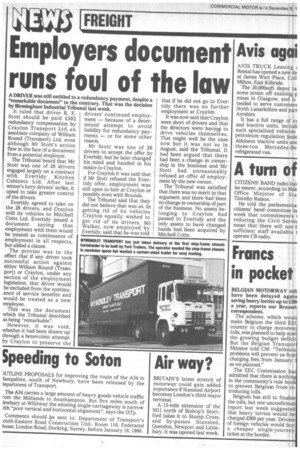Employers document runs foul of the low
Page 20

If you've noticed an error in this article please click here to report it so we can fix it.
A DRIVER was still entitled to a redundancy payment, despite a "remarkable document" to the contrary. That was the decision by Birmingham Industrial Tribunal last week.
It ruled that driver R. E. Stott should be paid E302 redundancy compensation by , Craylon Transport Ltd, an associate company of William Round (Transport) Ltd, even although Mr Stott's action flew in the face of a document from a potential employer.
The Tribunal heard that Mr Stott was one of 28 drivers engaged largely on a contract with Evertidy Kitchen Cabinets Ltd. After last winter's lorry drivers' strike, it opted to take greater control of the drivers.
Evertidy agreed to take on the 28 drivers, and Oraylon sold its vehicles to Mitchell Cotts Ltd. Evertidy issued a document saying that employment with them would be treated as continuance of employment in all respects, but added a clause.
The proviso was to the effect that if any driver took successful action against either William Round (Transport) or Craylon, under any section of the employment legislation, that driver would be excluded from the continuance of service benefits and would be treated as a new employee.
This was the document which the Tribunal described as being "remarkable".
However, it was void, whether it had been drawn up through a benevolent attempt by Craylon to preserve the drivers' continued employment — because of a determined attempt to avoid liability for redundancy payments — or for some other reason.
Mr Stott was one of 26 drivers to accept the offer by Evertidy, but he later changed his mind and handed in his notice to Craylon.
For Craylon it was said that if Mr Stott refused the Evertidy offer, employment was still open to him at Craylon or possibly even with Rounds.
The Tribunal said that they did not believe that was so. In getting rid of its vehicles Craylon equally wished to get rid of its drivers. Mr Walker, now employed by Evertidy, said that he was told that if he did not go to Evertidy there was no further employment at Craylon.
It was now said that Craylon were short of drivers and that the directors were having to drive vehicles themselves. That might well be the case now but it was not so in August, said the Tribunal. It had been argued that there had been a change in ownership in the business and Mr Stott had unreasonably refused an offer of employment by the new owner.
The Tribunal was satisfied that there was no merit in that argument and there had been no change in ownership of part of the business. No assets belonging to Craylon had passed to Evertidy and the only assets to have changed hands had been acquired by Mitchell Cotts.
























































































































































